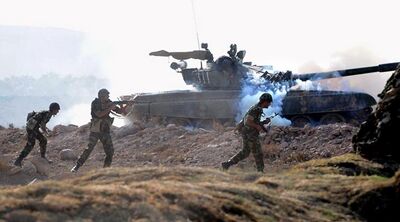Operation Kontos
Operation Kontos, also known as the 1st Balatonalmádi Campaign or the Balatonalmádi Bloodbath, was an offensive carried out by Syara during the Zemplen War.
Following the failure of Operation Hippikon in October, the Syaran Commonality Armed Forces attempted to maintain pressure on the Imperial Armed Forces of Ruvelka by launching a major offensive in the Balatonalmádi and Kiskőrös Districts of western Ruvelka. Four Syaran armies, 6th, 4th, 9th, and 8th, would carry out an encirclement of three Ruvelkan Fronts (11th Kiskőrös, 2nd Székesfehérvár, and 8th Balatonalmádi), destroying 75% of Army Group Center in the process and blowing a massive hole through the Ruvelkan front line. The operation's success would also cut through the Sarvárda-Püspökladány Highway, bisecting the Ruvelkan Fronts and cutting off Army Group South from the rest of the Ruvelkan armies.
The Syarans began their attack on 4 November and initially made good progress in 6th and 8th Army's sectors, but Ruvelkan General Eliska Hanáková quickly deduced the Syaran intentions and purposefully gave ground against the 8th and 9th Armies, while grinding down the 4th and 6th Armies which were still recovering from the fighting in October. 9th Army's advance into the Balatonalmádi District became overstretched as Ruvelkan infiltrators and airstrikes hammered Syaran supply lines, while the increasingly rough terrain inhibited major Syaran mechanized operations. On 12 November the Ruvelkans launched a counter-attack against the 8th Army, which had become exposed due to 9th Army's slowing rate of advance. Although the Ruvelkans lost the cities of Vyerhnyasty and Starolaiv, by 18 November it was clear the Syarans lacked the means to continue carrying out offensive operations and Syaran Central Command ordered an end to the offensive.
Despite gains in some sectors, the end of Operation Kontos left the Syarans in an awkward position with their various corps and armies holding an uneven front line with limited ability for lateral support and regrouping. The approaching winter and snowfall caused the Syarans to temporarily suspend many of their operations, granting the Ruvelkans a much needed period to rest and refit. Many of the gains the Syarans made would be lost during the Ruvelkan Winter Counter-Offensive, which took advantage of the poor positioning of many Syaran units.
Background
During Operation Aspis Syaran forces had seized multiple major urban centers along the Syaran-Ruvelkan border, but in some locations stiff resistance by Ruvelkan forces had created gaps in the Syaran frontage. As a result, the three Syaran army groups, Alpha in the north, Beta in the center, and Gamma in the south, did not share a cohesive front line. Operation Hippikon launched in October 2008 had managed to link up Army Groups Alpha and Beta between the cities of Malavinsk and Vatuseve, but in the Balatonalmádi district Beta and Gamma remained separated between the cities of Drahizyork and Dunakesi. While Syaran forces had captured Dunakesi during Operation Aspis, the Syaran 8th Army was not holding an exposed salient that Syaran forces from 9th Army could not directly support. Between the two Army Groups were forces of the 12th Pálháza Front, while further north were the 8th Balatonalmádi and 2nd Székesfehérvár Fronts.
